The Intersection of Emotion and Addiction Recovery
Addiction recovery is a complex journey that extends beyond abstaining from substances. Central to this process is emotional regulation—the capacity to manage and respond to emotional experiences effectively. For individuals struggling with substance use disorders, emotional dysregulation is often both a driver and a consequence of addiction, creating a challenging cycle. This article explores why emotional regulation is crucial in addiction recovery, the neuroscience behind emotional difficulties in addiction, and the therapeutic interventions designed to empower individuals on their road to lasting sobriety.
Understanding Emotional Dysregulation in Substance Use Disorders
What is emotional dysregulation?
Emotional dysregulation refers to difficulties in managing and responding to emotional experiences in a controlled and adaptive manner. This can include challenges in recognizing, understanding, and modulating emotions, leading to impulsive reactions or ineffective coping.
How prevalent is emotional dysregulation in substance use disorders?
Individuals with substance use disorders (SUDs) exhibit significantly higher difficulties in emotional regulation compared to those without such disorders. These difficulties are both widespread and severe, affecting various areas of emotional control.
How is emotional dysregulation measured?
The Difficulties in Emotion Regulation Scale (DERS) is commonly used to assess emotional regulation challenges. Research demonstrates that people with SUDs score about 21 points higher on the DERS, indicating substantial emotion regulation impairments with a large effect size (Hedges' g = 1.05).
What does the emotional regulation difficulty profile look like in people with SUDs?
Individuals struggling with SUDs show consistent deficits across all domains measured by DERS, particularly in impulse control and use of effective regulation strategies. They tend to rely more on maladaptive methods like expressive suppression, which further exacerbates emotion management problems.
These pervasive emotion regulation difficulties contribute directly to addiction behaviors and complicate recovery but also provide a target for therapeutic intervention to support long-term sobriety.
The Bidirectional Relationship Between Emotion Regulation and Addiction
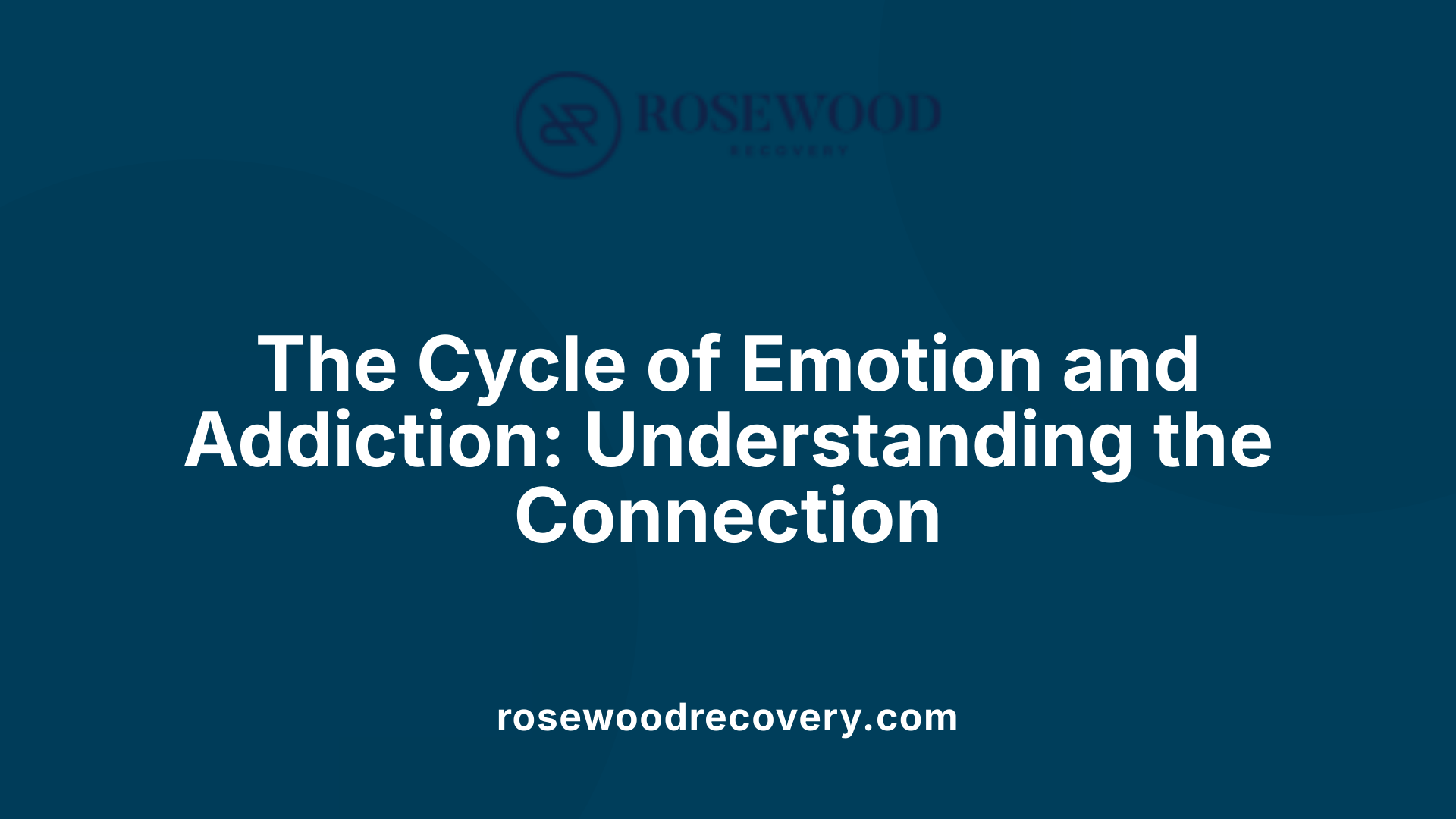
How are emotion regulation deficits both a risk factor and consequence of substance use disorders?
Emotion regulation deficits significantly contribute to the development of substance use disorders (SUDs). Individuals struggling with poor control of their emotions often face intensified feelings of stress, anxiety, and depression. These heightened negative emotional states can lead individuals to use substances as a coping mechanism, effectively self-medicating to manage overwhelming emotions.
Conversely, addiction further impairs emotional regulation abilities. Chronic substance use disrupts the brain's emotional processing, deepening individuals' difficulties in managing emotions. This creates a vicious cycle where emotional dysregulation fosters substance use, which in turn worsens emotional control.
Research shows that abstinence can lead to improvements in emotion regulation. Some individuals who stop using substances regain better emotional control over time. However, for others, emotional regulation difficulties persist even after achieving abstinence, highlighting the need for continued therapeutic support focused on emotional skills.
Emotion regulation deficits as a risk factor for addiction
Poor emotional regulation makes one more susceptible to addiction by increasing vulnerability to negative emotions and stress, which often triggers substance use as an escape or relief.
How addiction worsens emotional control
Addictive substances alter brain chemistry and function, impairing the mechanisms responsible for recognizing, understanding, and managing emotions.
Improvements following abstinence
Ceasing substance use can allow partial recovery of emotional regulation functions, supporting better emotional stability and reducing relapse risk.
Persistence of difficulties post-abstinence
Some individuals continue to experience significant challenges with emotion regulation after stopping substance use, underscoring the importance of ongoing treatment interventions centered on emotion skills.
This bidirectional relationship highlights the critical role of addressing emotional regulation in addiction treatment, using therapies such as DBT and CBT to break the cycle between emotional dysregulation and substance use.
The Role of Emotional Regulation in Holistic Addiction Treatment Programs
What Are Comprehensive Treatment Services for Substance Abuse and Mental Health Issues?
Comprehensive treatment services for addiction and mental health combine medical, psychological, and social interventions designed to meet the unique needs of each individual. These services typically include evidence-based therapies like cognitive-behavioral therapy (CBT) and family counseling, medication management, and structured settings such as inpatient and outpatient care. Long-term support is often emphasized to maintain recovery and prevent relapse.
How Do Treatment Programs Address Various Forms of Addiction Holistically?
Holistic addiction treatment addresses the whole person — physically, emotionally, mentally, and spiritually. Beyond traditional medicine and counseling, these programs incorporate complementary therapies such as mindfulness meditation, yoga, nutritional counseling, and expressive arts therapy. This approach helps reduce emotional distress, manage cravings, and build resilience, ultimately decreasing the risk of relapse while promoting overall well-being.
How Is Emotional Regulation Integrated Within These Treatment Programs?
Emotional regulation training is a fundamental component of holistic addiction treatment. Therapies like Dialectical Behavior Therapy (DBT) and CBT actively teach skills to understand and manage intense emotions, improve impulse control, and develop healthier coping strategies. Emotional regulation interventions are tailored to help individuals identify triggers, regulate emotional responses, and handle cravings without resorting to substances. This integration supports recovery by enhancing emotional stability, reducing relapse likelihood, and addressing underlying causes such as trauma or co-occurring mental health conditions.
By embedding emotional regulation into a broad spectrum of treatments, holistic programs create a nurturing environment where individuals can heal comprehensively and sustain long-term sobriety.
Why Emotional Regulation Is a Crucial Skill in Addiction Recovery
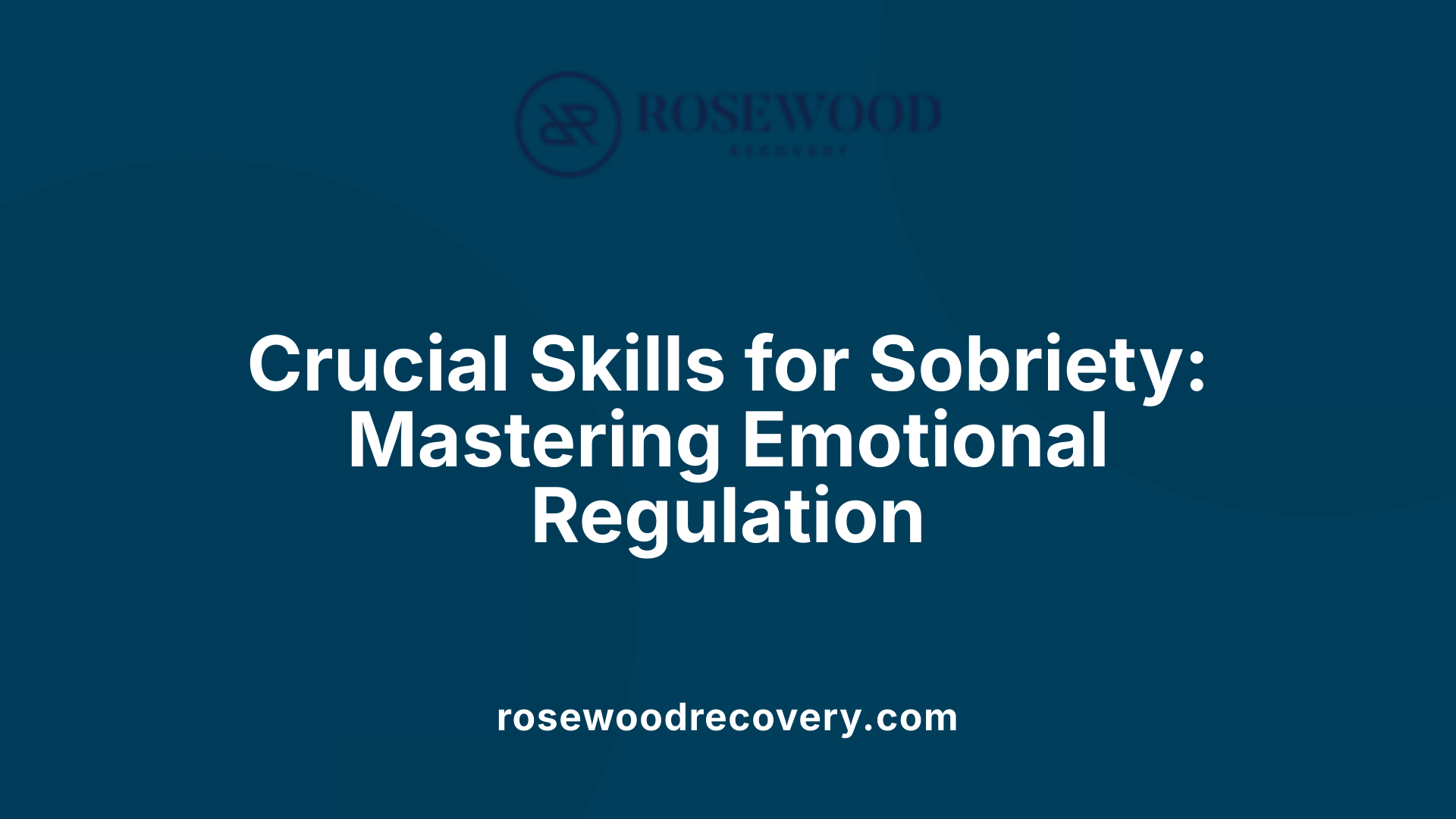
How emotional regulation impacts cravings and relapse
Effective emotional regulation plays a significant role in reducing cravings and preventing relapse in individuals recovering from substance use disorders. Research shows that individuals with poor emotional regulation have higher relapse rates because they struggle to manage intense emotional triggers that often lead to substance use as a form of coping. By learning to identify and control these emotional responses, people can lower their cravings and resist the urge to use substances.
Role in managing stress and triggers
Emotional regulation is essential in handling everyday stress and specific triggers that threaten sobriety. During recovery, heightened emotional sensitivity can cause overwhelming feelings that lead to impulsive decisions or relapse. Developing skills such as mindfulness, cognitive restructuring, and distress tolerance enables individuals to respond to stressful events more calmly and thoughtfully. This increased emotional stability contributes to better interpersonal relationships and greater resilience in challenging situations.
Development of healthier coping mechanisms
One of the main benefits of emotional regulation training is the promotion of healthier coping strategies. People with substance use disorders often rely on drugs or alcohol to numb negative emotions, trauma, or stress. Emotional regulation techniques teach healthier ways to process and manage emotions, including deep breathing, journaling, physical activity, and seeking social support. These skills build emotional resilience and empower individuals to face difficulties without resorting to substance use.
Emotional regulation not only reduces the immediate risk of relapse but also improves overall mental health by alleviating co-occurring issues such as anxiety and depression. Therapies like Dialectical Behavior Therapy (DBT) and Cognitive Behavioral Therapy (CBT) focus on enhancing these skills, helping patients maintain long-term sobriety and achieve greater emotional well-being. In summary, emotional regulation is a foundational skill that underpins successful addiction recovery by addressing the emotional challenges that often drive substance use behavior.
Common Emotional Regulation Deficits Among Those with Substance Use Disorders
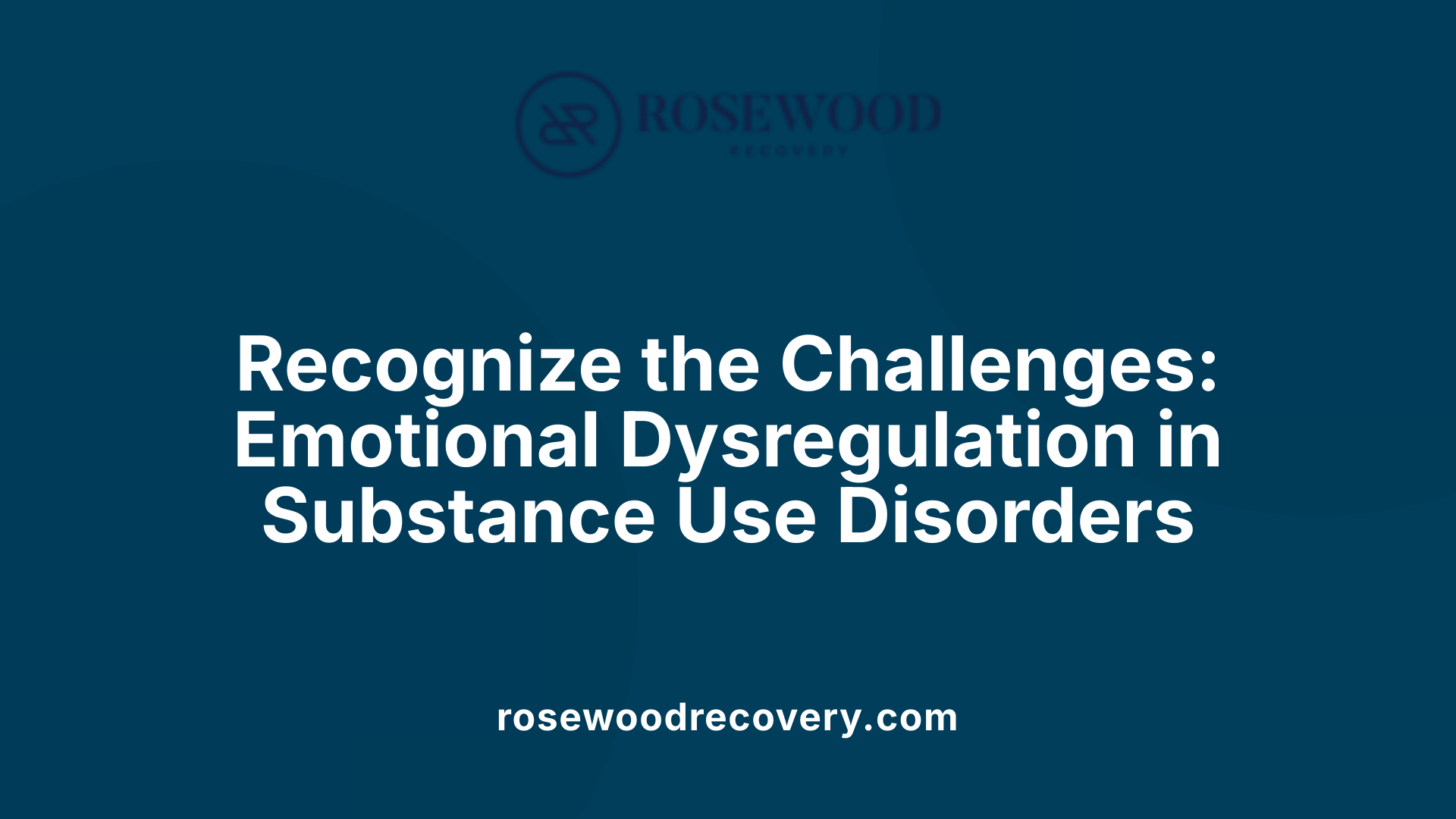
What are some typical emotional regulation challenges among people with substance use disorders?
Individuals with substance use disorders (SUDs) face several pronounced emotional regulation challenges. One notable difficulty is the frequent use of expressive suppression — a strategy where individuals inhibit emotional expression. This tendency is more common among those with SUDs compared to individuals without such disorders, making it harder to manage emotions effectively.
Impulse control is another significant challenge. Subscales within the Difficulties in Emotion Regulation Scale (DERS), especially those measuring impulse control, reveal large deficits for people with SUDs. These impulse control problems can lead to maladaptive reactions to emotional distress, increasing the likelihood of turning to substances as a coping mechanism.
Moreover, many individuals with SUDs develop maladaptive coping strategies like substance use itself to regulate overwhelming emotions. This reliance on substances can perpetuate emotion regulation problems, creating a cycle that's difficult to break.
Additional Emotional Regulation Challenges
- Pervasive Deficits: All subscales on the DERS suggest widespread emotion regulation difficulties, affecting strategies, impulse control, awareness, clarity, and acceptance of emotions.
- Craving and Triggers: Poor regulation impacts how individuals respond to cravings and emotional triggers, often resulting in relapse.
Addressing these challenges through targeted interventions, such as Dialectical Behavior Therapy (DBT) and Cognitive Behavioral Therapy (CBT), is essential for effective recovery and long-term sobriety.
Evidence-Based Therapies Targeting Emotional Regulation in Recovery
Which therapeutic approaches effectively support emotional regulation in addiction treatment?
Therapeutic approaches like Dialectical Behavior Therapy (DBT), Cognitive Behavioral Therapy (CBT), Emotion-Focused Therapy (EFT), and Expressive Arts Therapy play vital roles in addiction recovery by improving emotional regulation skills.
DBT combines cognitive-behavioral techniques with mindfulness to help individuals manage intense emotions, develop distress tolerance, and enhance interpersonal effectiveness. This therapy focuses on teaching practical skills such as mindfulness, radical acceptance, and emotional regulation strategies, which support managing impulses and reducing emotional sensitivity.
CBT helps individuals recognize and restructure negative thought patterns that contribute to emotional distress. It enhances emotional awareness and builds adaptive coping mechanisms, reducing reliance on substances to manage feelings.
EFT concentrates on helping patients process and transform emotional experiences, fostering a deeper understanding and acceptance of emotions. This therapeutic approach increases emotional resilience and capacity for healthy emotional expression.
Expressive Arts Therapy uses creative methods like art, music, and movement to facilitate emotional exploration and regulation. This modality encourages non-verbal expression, helping clients engage with emotions in a safe and supportive environment.
Together, these therapies bolster emotional regulation by enhancing impulse control, emotional awareness, and resilience. Incorporating these evidence-based methods into addiction treatment reduces relapse risk and supports sustained recovery by addressing the emotional challenges that often underlie substance use disorders.
Mindfulness and Meditation as Tools for Enhancing Emotional Control
How do mindfulness and meditation support emotional regulation in addiction recovery?
Mindfulness and meditation play a crucial role in fostering emotional regulation, particularly in individuals recovering from substance use disorders. These practices cultivate present-moment awareness, which allows individuals to observe their thoughts and feelings without immediate judgment or reaction. This heightened awareness helps reduce impulsivity and the tendency to respond to emotional distress through substance use.
Integrating mindfulness techniques into addiction recovery programs has shown significant benefits. Many evidence-based therapies, such as Dialectical Behavior Therapy (DBT) and Cognitive Behavioral Therapy (CBT), incorporate mindfulness training to strengthen emotional resilience and coping skills. Patients learn to identify emotional triggers and manage cravings more effectively by staying grounded in the present moment.
For individuals struggling with emotional dysregulation, mindfulness and meditation offer practical tools to interrupt patterns of overwhelming emotional responses. Regular practice can decrease emotional reactivity, improve distress tolerance, and promote a sense of calm, thereby reducing the risk of relapse.
Overall, mindfulness and meditation support the development of healthier coping mechanisms that are essential for sustained recovery and improved emotional well-being.
Building Emotional Resilience Through Comprehensive Coping Strategies
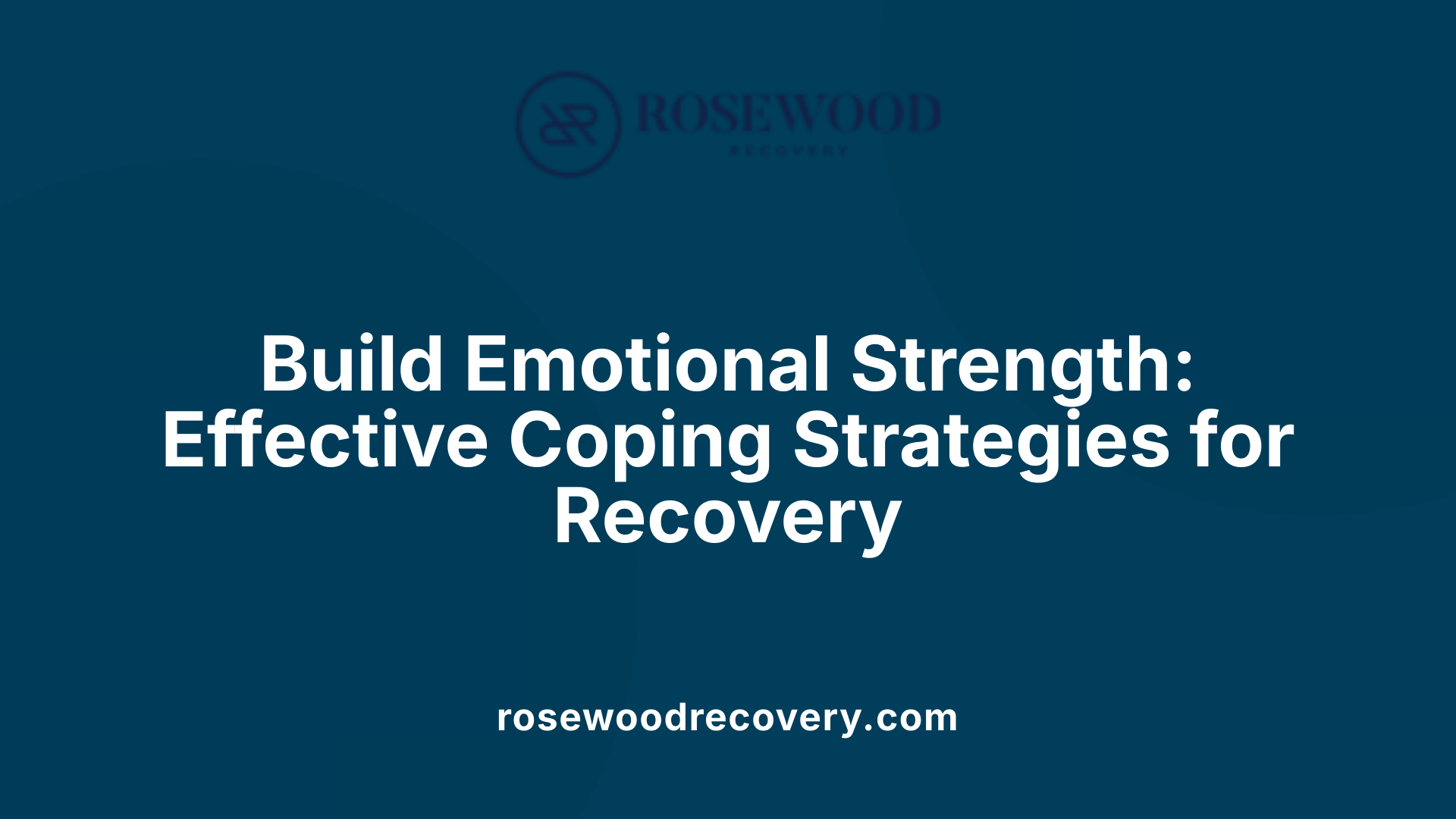
What are effective coping strategies for building emotional resilience in recovery?
Emotional resilience is crucial for individuals recovering from substance use disorders, helping them navigate stress and emotional challenges without turning to substances. Several effective coping strategies contribute to building this resilience.
Deep Breathing: This technique promotes relaxation by activating the body's parasympathetic nervous system. Regular practice of deep breathing can reduce anxiety, calm the mind, and improve emotional regulation during moments of distress or craving.
Journaling: Writing about thoughts and emotions allows individuals to process feelings constructively. Journaling enhances self-awareness, helps in identifying emotional triggers, and supports cognitive restructuring which is essential for maintaining sobriety.
Physical Activity: Exercise not only improves physical health but also releases endorphins that elevate mood and reduce stress. Engaging in regular physical activity can decrease symptoms of depression and anxiety, common co-occurring issues in addiction recovery.
Social Support Systems: Building and relying on a supportive network of friends, family, or support groups provides emotional encouragement, accountability, and a sense of belonging. This social connection is vital for maintaining motivation and emotional stability.
These strategies work synergistically to help individuals regulate their emotions, manage stress, and reinforce healthier coping mechanisms. Incorporating them into addiction treatment and aftercare enhances emotional regulation skills, reduces relapse risk, and supports long-term recovery success.
Addressing Co-Occurring Mental Health Conditions Through Emotional Regulation
How does emotional regulation relate to co-occurring mental health issues in addiction?
Emotional dysregulation plays a significant role in the relationship between substance use disorders (SUDs) and co-occurring mental health conditions such as depression and anxiety. Individuals struggling with these disorders often experience intense, overwhelming emotions and impulsive reactions, which contribute to both their mental health symptoms and substance use.
Common co-occurring disorders: Depression and anxiety
Depression is characterized by persistent sadness, fatigue, guilt, and suicidal thoughts lasting at least two weeks. Anxiety disorders, similarly, involve excessive worry and emotional distress. Research shows that people with major depression are twice as likely to have a substance use disorder, and those with bipolar disorder are about seven times more likely. Many individuals self-medicate with drugs or alcohol to manage these distressing symptoms, which often worsens both conditions.
Interrelation with emotional dysregulation
Emotional dysregulation significantly contributes to the onset and persistence of co-occurring disorders. It heightens feelings of stress, anxiety, and depression, leading to maladaptive coping strategies such as substance use. Additionally, long-term drug use can impair emotional regulation, creating a vicious cycle.
Integrated treatment approaches
Treatment programs use an integrated approach addressing both addiction and mental health simultaneously. Evidence-based therapies like Cognitive Behavioral Therapy (CBT) and Dialectical Behavior Therapy (DBT) focus on improving emotional regulation skills, helping individuals manage intense emotions and reduce relapse risk.
These therapies also incorporate mindfulness, distress tolerance, and cognitive restructuring techniques to foster emotional stability and resilience.
Specialized programs, such as those offered by American Addiction Centers, combine psychotherapy, medication, and behavioral therapies to provide comprehensive care for co-occurring disorders. Emotional regulation is the cornerstone of these approaches, enhancing treatment outcomes by targeting the underlying emotional dysfunction that fuels both addiction and mental health challenges.
Specialized Programs Focused on Emotional Regulation Skill Development
What specialized programs focus on emotional regulation skills in addiction treatment?
Several specialized programs in addiction treatment prioritize teaching emotional regulation skills to support recovery. One notable example is the CARE program, which uses Dialectical Behavior Therapy (DBT) skills training. DBT helps individuals manage their emotions and navigate interpersonal interactions effectively, which is crucial for preventing relapse and improving mental health.
What does structured emotion regulation training involve?
Structured emotion regulation training often employs a protocol based on the Gross model of emotion regulation. This training is delivered through group sessions, typically eight in number, where participants learn a variety of strategies such as:
- Situation selection: choosing situations to influence emotional outcomes
- Situation correction: modifying ongoing situations to regulate emotions
- Attention expansion: shifting focus to alter emotional impact
- Cognitive evaluation: reappraising thoughts to change emotional responses
- Response adjustment: managing emotional reactions proactively
This comprehensive approach aims to reduce craving beliefs and signs of temptation linked to substance use, thereby lowering relapse risks.
How do group sessions facilitate emotion regulation strategy learning?
Group sessions create a supportive environment where individuals can practice these strategies together. Facilitators guide participants through exercises that develop skills to manage negative emotions and cravings effectively. The collective experience also fosters resilience and accountability, encouraging sustained application of emotion regulation techniques in real-life scenarios.
By integrating DBT-based programs like CARE and structured group-based emotion regulation training, addiction treatment centers provide targeted support that addresses the emotional challenges frequently underlying substance use disorders.
The Science Behind Emotional Regulation Interventions Reducing Relapse
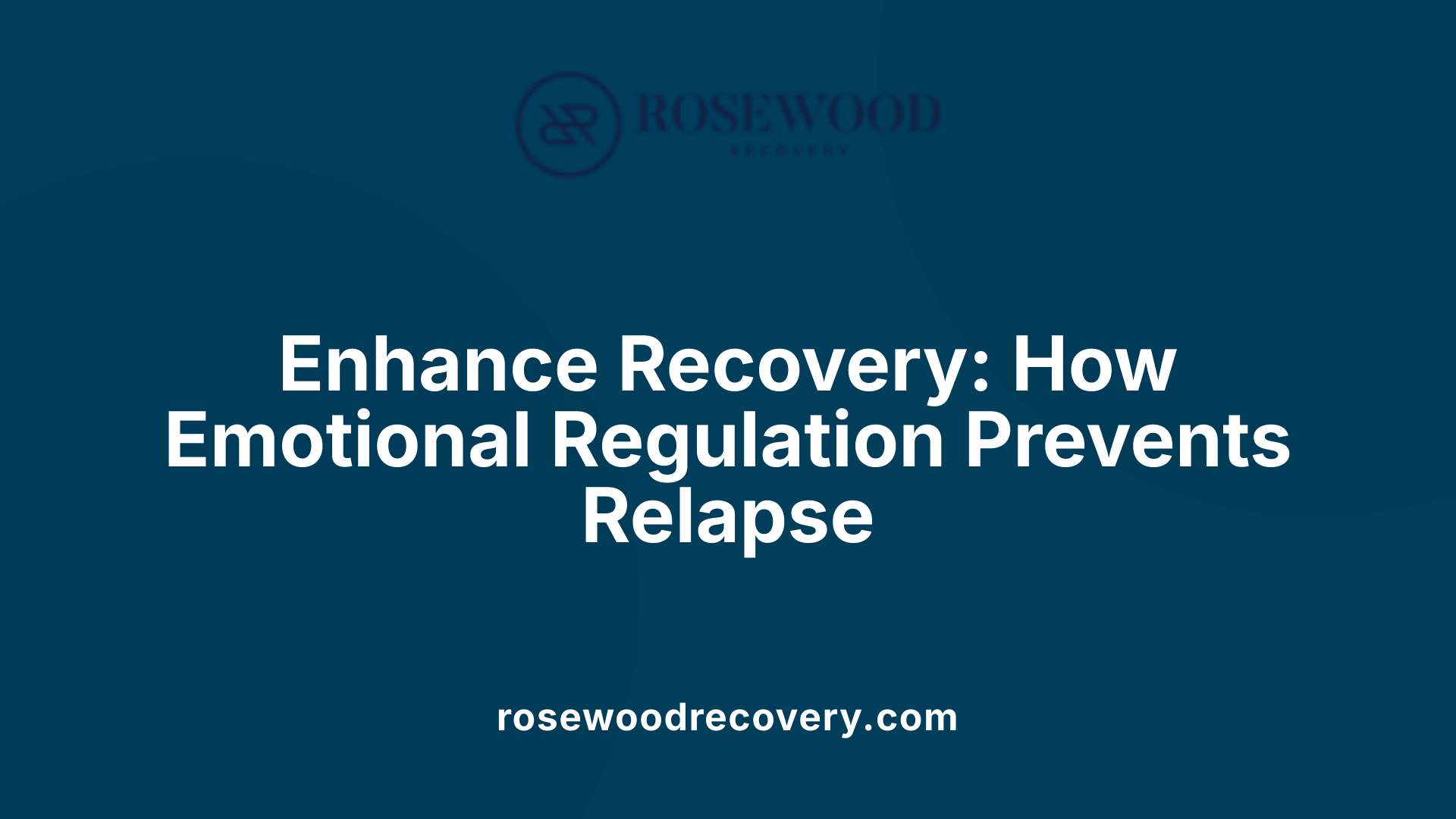
How do emotional regulation interventions impact relapse prevention?
Research demonstrates that poor emotional regulation is linked to approximately 75% of addiction cases, underscoring its critical role in both the onset and continuation of substance use disorders (SUDs). Moreover, deficits in managing emotions significantly raise relapse risk, making the development of these skills essential for lasting recovery.
Research linking emotional dysregulation to relapse rates
Studies have consistently found that individuals struggling with emotional dysregulation experience heightened cravings and stronger emotional triggers, which can lead to substance reuse. Conversely, effective emotional regulation diminishes the intensity of these triggers and the compulsive desire to use substances.
Effects of emotion regulation training on craving reduction
Emotion regulation training programs, based on models like Gross's framework, include strategies such as situation selection, cognitive reappraisal, and response modulation. Research indicates that individuals who participate in these structured programs report significant reductions in craving beliefs and signs of temptation. This directly correlates with a decreased likelihood of relapse, as better emotional control minimizes impulsive responses to distress.
Role of structured therapeutic protocols
Structured therapeutic protocols, often delivered over multiple group sessions, systematically teach emotion regulation techniques. These protocols help individuals recognize emotional cues, develop alternative coping mechanisms, and adjust their responses to stressful situations. For example, programs incorporating dialectical behavior therapy (DBT) equip clients with mindfulness and distress tolerance skills, which are shown to enhance emotional resilience and reduce vulnerability to relapse.
In summary, emotional regulation interventions are scientifically validated methods to reduce relapse by attenuating craving intensity and improving emotional management. Implementing these interventions within addiction treatment frameworks enhances recovery success and fosters long-term sobriety.
Practical Emotional Regulation Techniques Employed in Treatment
What practical emotional regulation techniques are used in addiction treatment?
Addiction treatment programs employ several practical techniques to enhance emotional regulation, helping individuals manage difficult feelings and reduce relapse risks.
Mindfulness and body scans are widely used to foster present-moment awareness, allowing individuals to observe emotions without judgment. Mindfulness meditation paired with body scans helps clients become aware of physical sensations linked to emotional distress, promoting calm and grounding.
Cognitive restructuring involves teaching individuals to recognize and challenge negative thought patterns. This method enables them to reframe upsetting or distorted perceptions, which reduces emotional intensity and supports healthier responses to triggers.
Breathing and grounding exercises are crucial distress tolerance tools. Deep breathing techniques slow physiological arousal during emotional crises, while grounding strategies help reorient attention to the present environment, reducing overwhelming feelings.
Journaling and physical activity both support emotional processing and resilience. Writing about emotions encourages reflection and insight, while physical exercise releases tension and improves mood through endorphin production.
Together, these techniques build skills for managing impulses and cravings, increasing emotional stability and supporting sustained recovery. Many therapeutic models, including Dialectical Behavior Therapy (DBT) and Cognitive Behavioral Therapy (CBT), integrate these practices to create comprehensive emotion regulation training.
Emotional Regulation: The Cornerstone of Lasting Recovery
Emotional regulation stands as a cornerstone in addiction recovery, influencing how individuals navigate cravings, stress, and co-occurring mental health challenges. The pervasive emotional regulation deficits observed in people with substance use disorders underscore the need for treatment programs to incorporate evidence-based strategies that strengthen emotional awareness, impulse control, and resilience. Through integrated therapies—such as DBT, CBT, mindfulness, and expressive arts—recovering individuals gain tools not only to manage emotions but also to rebuild healthier lives with reduced relapse risk and enhanced well-being. Embracing emotional regulation within a comprehensive, holistic treatment framework ultimately fosters sustainable sobriety and improved quality of life for those on the path to recovery.
References
- Emotion regulation in substance use disorders
- Emotional Regulation in Addiction Treatment at Antrim, NH
- The Importance of Emotional Regulation in Recovery
- Empowering Wellness: Emotional Regulations Impact On ...
- Effectiveness of Emotion Regulation Training on the ...
- The Role of Emotions in Recovery and Treatment
- Emotional Regulation in Recovery: Behavioral Health Support
- The Importance of Emotional Regulation | Mental Health
- Treatment Types for Mental Health, Drugs and Alcohol
- Holistic Therapy for Addiction Treatment




